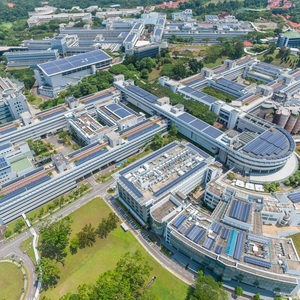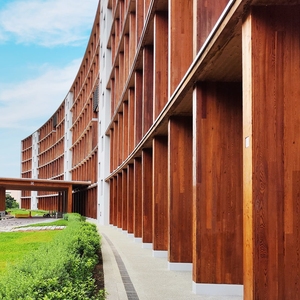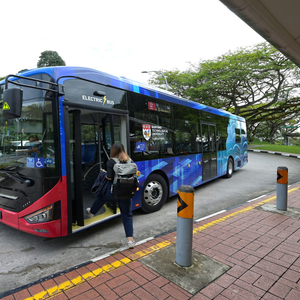Energy and carbon reduction - A total holistic approach by Nanyang Technological University, Singapore
Nanyang Technological University
Project Overview
Nanyang Technological University (NTU) has been actively implementing various energy reduction efforts to promote sustainability and reduce its carbon footprint. The university recognizes the importance of energy conservation and has implemented several initiatives to achieve this goal.
One key initiative is the adoption of energy-efficient technologies and practices across the campus. NTU has implemented smart lighting/lift-operation systems, plug load controllers, and energy-efficient passive displacement ventilation systems in buildings to optimize energy consumption. The university also has a program coordinated by the university's Sustainability and Development offices, where energy audits and monitoring are carried out by each school's dedicated energy manager in identifying areas of improvement and implement further energy-saving measures.
Despite the lack of natural resources in Singapore, NTU has made significant investments in renewable energy sources. It has installed solar panels on buildings roof tops,, generating clean energy and reducing reliance on power from the national grid. These solar installations contribute to the overall energy reduction efforts on campus.
The university also promotes sustainable transportation options. It encourages the use of public transport, cycling, and walking through the provision of well-connected pedestrian paths and cycling infrastructure. NTU has also electrified its' shuttle bus services for students and staff, where it is provided free of charge.
Furthermore, NTU actively promotes energy conservation awareness and education among its students, faculty, and staff. The university organizes sustainability campaigns, workshops, and seminars to raise awareness about the importance of energy reduction and sustainable practices. Both students and staff (academic and non-academic) are encouraged to participate in energy-saving initiatives (through user-behaviour green nudges) and contribute to the university's sustainability goals.
Through these efforts, NTU demonstrates its commitment to sustainable development and environmental stewardship. By integrating energy reduction measures, investing in renewable energy, and promoting sustainable transportation and awareness, NTU strives to create a greener and more sustainable campus for its community.
Background
NTU, like many educational institutions worldwide, are pushing for sustainability due to several important reasons:
Environmental Responsibility: NTU recognises its' role in protecting the environment and addressing climate change. By prioritizing sustainability, NTU aims to reduce its' carbon footprint, waste generation and energy/water consumption and thereby contribute to a more sustainable future.
Global Commitments: Singapore, as a nation, has made international commitments to sustainable development, such as the United Nations' Sustainable Development Goals (SDGs) and the Paris Agreement on climate change. NTU understands that universities like itself play a vital role in fulfilling these commitments by integrating sustainability into its' operations, research, and education.
Research and Innovation: NTU has been pushing the boundaries of research and innovation. By focusing on sustainability, NTU can contribute to finding solutions to sustainability challenges, developing sustainable technologies with its' industry partners, and fostering sustainable practices across various industries.
Educational Excellence: Sustainability is a critical topic in today's world, and NTU knows that it needs to equip students with the knowledge and skills to address sustainability challenges. By integrating sustainability into its' curricula and research programs, NTU can prepare students to become future leaders who can drive positive change in environmental stewardship.
Campus Operations and Efficiency: With its' corporate research centres and laboratories, NTU like many other notable universities requires significant energy and resource consumption to support its' operations (research and non-research related). By adopting sustainable practices and leveraging on user behaviour initiatives; such as energy-efficient buildings, waste reduction, and water conservation, NTU aims to reduce its' environmental impact and promote efficient resource management.
Student Demand and Activism: Students in NTU are increasingly passionate about sustainability and routinely engages the university on its' sustainability efforts. As such, NTU needs to embrace sustainability, engage students in sustainability initiatives, and provide platforms for student activism and involvement in sustainability-related projects.
Corporate Partnerships and Collaboration: NTU often collaborate with industry partners and government agencies to drive sustainable development. By championing sustainability, NTU can attract partners who share their commitment and collectively work towards sustainable solutions.
Essentially NTU recognize that sustainability is an essential aspect of its' mission, aligning with both national and global goals. By prioritizing sustainability, NTU believes it can contribute to a greener and more resilient future while equipping its' students with the necessary knowledge and skills to address complex environmental challenges.
Goals
In 2021, NTU unveils a 15-year sustainability manifesto supported by the $1 billion sustainability-linked bond Medium Term Note programme to accelerate its aim of achieving carbon neutrality by 2035. As part of the goals noted in the manifesto, NTU also aims to reduce net energy utilisation, water usage and waste generation by 50 per cent by March 2026, from 2011 baseline levels.
Implementation
NTU implements its energy and carbon reduction efforts through various strategies and initiatives.
Green Buildings (LEED equivalent): NTU focuses on constructing and operating energy-efficient buildings that are externally verified by the Singapore Building and Construction Authority (BCA, a government regulatory authority that certifies green buildings in Singapore). The university has implemented sustainable building practices, such as the use of energy-efficient technologies, sustainable materials, and green roofs. At this juncture, 97% of buildings in NTU are designed, certified and awarded under the Singapore Green Mark Platinum scheme.
Energy Audits and Monitoring through program coordinated by Sustainability and Development Offices in NTU: NTU conducts regular energy audits to assess energy usage across its campus. Through comprehensive monitoring and analysis of energy consumption patterns, the university identifies areas for improvement and implements targeted energy-saving measures. This program includes the direct involvement at the individual school-level so that schools have sense of ownership and are accountable to its' energy consumption.
Smart Grid and Energy Management Systems: NTU employs smart technologies and energy management systems. Innovative systems such as leveraging on the use of WIFI access points to optimise energy usage as an effective load management, and demand-response strategy to minimize energy wastage. NTU also develops an in-house energy/carbon tracking platform integrated with a 3D map of the campus to track and monitor energy usage at the campus wide level.
Renewable Energy: NTU has made significant investments in renewable energy sources. In November 2022, university has invested $5.7 million to increase solar energy production on campus by 74 per cent. With the additional panels, NTU’s total solar energy output will rise to 9.82 megawatt peak (MWp). These solar installations contribute to reducing the reliance on power supply from the national grid and lowering carbon emissions.
Energy Awareness and Education with involvement from multiple stakeholders: NTU promotes energy conservation awareness and education among its students, faculty, and staff. The university conducts energy-saving campaigns, workshops, and seminars to raise awareness about the importance of energy reduction and encourage energy-conscious behaviors.
Energy-Efficient Equipment and Appliances: NTU prioritizes the use of energy-efficient equipment and appliances across its campus, such as the use of plug-load controllers for all its'' water dispensers. Additionally, other highlights include the selection of energy-efficient chiller plant systems, lighting fixtures, replacing traditional air conditioning systems to passive displacement ventilation systems that aims to minimise energy consumption without compromising functionality.
Campus Lighting Optimization: NTU optimizes its lighting systems to reduce energy wastage. The university employs efficient lighting technologies, such as LED lighting and motion sensors, to ensure that lighting is only active when needed and adjusts brightness levels according to the surroundings.
Collaboration and Partnerships: NTU collaborates with industry partners, research institutions, and government agencies to drive energy-efficient technologies and practices. Through research projects and partnerships, the university contributes to the development of innovative solutions and best practices in energy reduction. NTU is also a living test-bed for innovative energy/carbon reduction technologies.
These strategies collectively contribute to NTU's energy reduction efforts, helping the university minimize energy consumption, optimize energy usage, and promote sustainability in its operations. By integrating energy-saving measures, investing in renewable energy, and raising awareness, NTU demonstrates its commitment towards energy efficiency and carbon neutrality.
Timeline
Since the launch of NTU's sustainability manifesto and its' targets towards energy reduction and carbon neutrality in Oct 2021, NTU has established a Sustainability Office to centrally coordinate and drive sustainability-related activities and efforts at NTU. It aims to accelerate sustainability practices, raise awareness, and integrate sustainability into various aspects of the university's operations. NTU is not new to sustainability and even before the establishment of the Sustainability Office, NTU has been pushing the frontiers of sustainability in the many years before. Measuring from the 2 years since unveiling our targets, NTU has achieved a 30% reduction in energy consumption, despite an increase in gross floor area and campus population.
Financing
The inaugural issuance of the Medium Term Note of SGD 650 million by NTU, with a 15-year tenor marks the world’s first publicly-offered sustainability-linked bond (SLB) by a university. The financial proceeds from maiden issuance are applied in conjunction with NTU’s wide-ranging corporate and sustainability goals and activities aligned with its Sustainability Manifesto. NTU's performance towards carbon neutrality are third-party audited and assured on a yearly basis.
Results
NTU has achieved a 30% reduction in energy consumption, despite an increase in gross floor area and campus population.
Lessons Learned
The lessons below can guide NTU's future energy reduction strategies, enable the university to continually improve its sustainability practices and advance its' energy efficiency and carbon neutrality goals.
Collaboration and Knowledge Sharing: NTU can recognize the benefits of collaboration and knowledge sharing with other universities, research institutions, industry partners, and government agencies. Sharing experiences, lessons learned, and best practices can accelerate progress in energy reduction efforts and foster collective sustainability goals.
Behavioral Change and Education: NTU can learn from its energy reduction initiatives about the importance of behavioral change and education. Promoting sustainable behaviors, providing training and education on energy conservation, and frequently engaging the NTU community.
Integration of Research and Innovation: NTU can leverage its research and innovation capabilities to further advance energy reduction efforts. By integrating research findings, technological innovations, and sustainable practices into campus operations, NTU can lead by example and contribute to knowledge creation in the field of energy conservation.



